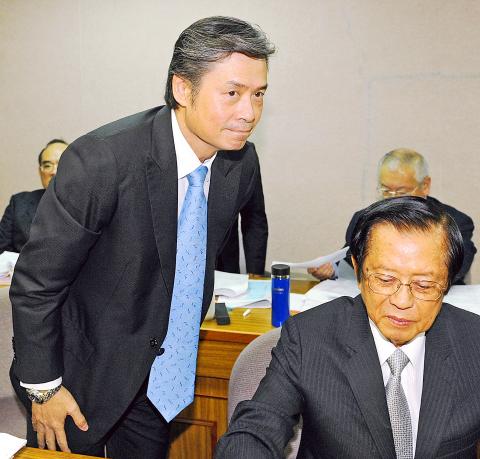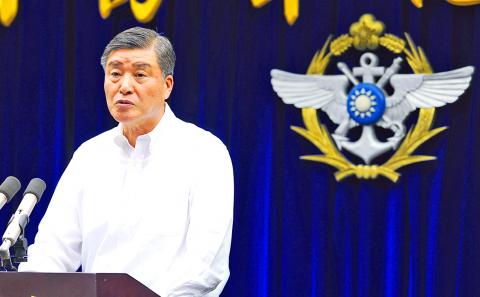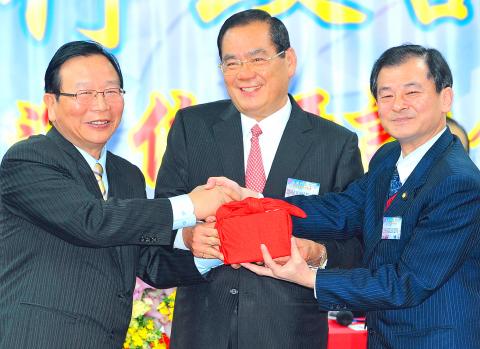The Presidential Office yesterday said it has approved the resignations of National Security Council Secretary-General King Pu-tsung (金溥聰) and Presidential Office Secretary-General Timothy Yang (楊進添), despite President Ma Ying-jeou (馬英九) repeatedly calling for the two officials to remain in their posts.
King is to be succeeded by former minister of national defense Kao Hua-chu (高華柱) and Yang by former deputy legislative speaker Tseng Yung-chuan (曾永權). The new appointments are set to take effect on Thursday next week.
The Presidential Office said that Yang tendered his resignation several days ago on the grounds that his mission had been completed, and, after being asked to remain by the president, resubmitted his resignation citing the need to take care of his elderly mother.

Photo: Chen Chih-chu, Taipei Times
Yang’s second attempt to resign was approved, and, in accordance with precedent, he is to be hired as a senior adviser to the president, the Presidential Office said.
King resigned for “personal health and family reasons” and was also asked not to leave by the president several times, according to the Presidential Office.
King reportedly underwent a coronary artery stenting procedure in October last year.

Photo: Luo Pei-teh, Taipei Times
A source told CNA that King had another heart operation last week, and his family has insisted that he leave his post due to the workload and pressure.
According to a CNA report, King is not expected to work in the near future.
Democratic Progressive Party Legislator Huang Wei-cher (黃偉哲) said he was surprised about the resignations, adding that Kao taking over the national security council was incomprehensible, as he previously resigned from his post as minister of national defense due to health concerns.

Photo: Wang Min-wei, Taipei Times
“The changes to power brought about by the shuffle between King and Kao are not easily understood. We hope that the Presidential Office would disclose more information regarding the arrangement so that the nation can have a clearer idea of what is going on,” Huang said.
Chinese Nationalist Party (KMT) Legislator Lin Yu-fang (林郁方) said King’s resignation also took him by surprise: “I seriously don’t know why [he resigned]; maybe he has other plans for his life.”
Meanwhile, Charles Chen (陳以信), previously deputy commissioner of the KMT's Culture and Communication Committee, is to replace Yin Wei (殷偉) as one of the Presidential Office's spokespersons, with the other being Ma Wei-kuo (馬瑋國). Yin will serve as the president's secretary, in charge of the president's speechwriting team.

AGING: As of last month, people aged 65 or older accounted for 20.06 percent of the total population and the number of couples who got married fell by 18,685 from 2024 Taiwan has surpassed South Korea as the country least willing to have children, with an annual crude birthrate of 4.62 per 1,000 people, Ministry of the Interior data showed yesterday. The nation was previously ranked the second-lowest country in terms of total fertility rate, or the average number of children a woman has in her lifetime. However, South Korea’s fertility rate began to recover from 2023, with total fertility rate rising from 0.72 and estimated to reach 0.82 to 0.85 by last year, and the crude birthrate projected at 6.7 per 1,000 people. Japan’s crude birthrate was projected to fall below six,

Conflict with Taiwan could leave China with “massive economic disruption, catastrophic military losses, significant social unrest, and devastating sanctions,” a US think tank said in a report released on Monday. The German Marshall Fund released a report titled If China Attacks Taiwan: The Consequences for China of “Minor Conflict” and “Major War” Scenarios. The report details the “massive” economic, military, social and international costs to China in the event of a minor conflict or major war with Taiwan, estimating that the Chinese People’s Liberation Army (PLA) could sustain losses of more than half of its active-duty ground forces, including 100,000 troops. Understanding Chinese

US President Donald Trump in an interview with the New York Times published on Thursday said that “it’s up to” Chinese President Xi Jinping (習近平) what China does on Taiwan, but that he would be “very unhappy” with a change in the “status quo.” “He [Xi] considers it to be a part of China, and that’s up to him what he’s going to be doing, but I’ve expressed to him that I would be very unhappy if he did that, and I don’t think he’ll do that. I hope he doesn’t do that,” Trump said. Trump made the comments in the context

SELF-DEFENSE: Tokyo has accelerated its spending goal and its defense minister said the nation needs to discuss whether it should develop nuclear-powered submarines China is ramping up objections to what it sees as Japan’s desire to acquire nuclear weapons, despite Tokyo’s longstanding renunciation of such arms, deepening another fissure in the two neighbors’ increasingly tense ties. In what appears to be a concerted effort, China’s foreign and defense ministries issued statements on Thursday condemning alleged remilitarism efforts by Tokyo. The remarks came as two of the country’s top think tanks jointly issued a 29-page report framing actions by “right-wing forces” in Japan as posing a “serious threat” to world peace. While that report did not define “right-wing forces,” the Chinese Ministry of Foreign Affairs was